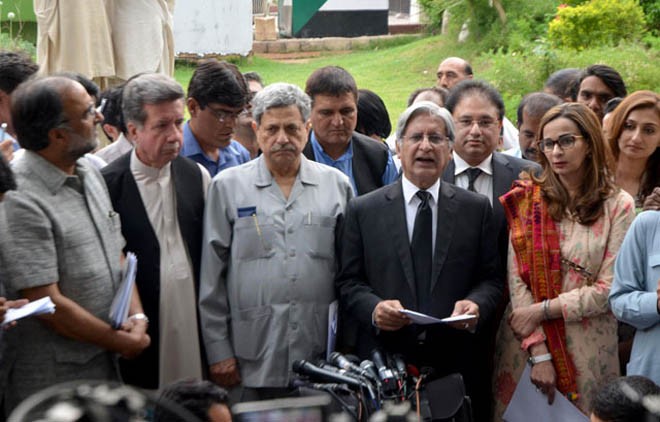
How the opposition parties are exploiting the Panama Leaks to push their way forward

After weeks’ long debate that generated harsh criticism against the Sharif family and even Imran Khan of Pakistan Tehreek-e-Insaf, for owning offshore businesses, opposition political parties agreed upon formation of a parliamentary committee which will frame the terms of reference on how to investigate offshore accounts. Twelve members of parliamentary committee, six each from both the opposition and the government, will prepare the terms of reference (ToRs) by the end of next month.
The confusion about possible legislation on the Leaks’ issue is quite natural. Many in the country believe that all the hullabaloo is about the elections in 2018, so people will have to wait for the storm to settle.
Experts think this scandal has apparently helped the leading opposition party -- the Pakistan Peoples Party (PPP) to steal the initiative from the PTI, the otherwise robust opposition in the parliament.
Before the Panama Leaks’ revelations, the PPP was viewed as an underdog party with its top leadership in self-imposed exile. The second tier leadership was facing allegations of corruption and was overshadowed by its opponents in Punjab and Khyber-Pakhtunkhwa.
The crisis has helped the party to regain the limelight by emerging as the main opposition group.
Analysts believe the Leaks issue have set a good contest between the two leading opposition parties -- PTI and PPP.
The PPP’s calculated advances might have been the result of a fear that pushing hard against Premier Sharif could trigger the security establishment’s involvement. Many PPP leaders, particularly Dr Asim, former petroleum minister, have come under investigation either through the National Accountability Bureau or Sindh Rangers.
No doubt the Panama Leaks have hit the ruling PML-N hard at a crucial time when the party leadership needed undivided attention to deliver its promises, says Islamabad-based political analyst Khawar Ghumman. "It’s PPP’s Punjab chapter which has literally come to life in the aftermath of the Panamagate scandal. So far, it seems that young Bilawal Bhutto has effectively played on the issue to revive his party’s fortune in the province by directly hitting out at the Sharif family."
Sakib Sherani, former economic advisor to the government, says that the Panama Leaks is unlikely to trigger a legislation to clean the society and political elites of corruption. "For now, it appears unlikely as the entire political system has been tainted. It would require either political leadership based on enlightened self-interest, or a genuine people’s movement, to force change."
He adds that while the issue has generated intense scrutiny and comment, corruption and abuse of public office are too entrenched in the system to be eliminated or reduced without a genuine desire for change from within the political system.
On Pakistan’s current laws and institutions’ capacity to probe money laundering and on how to strengthen them, Sherani says, "The laws and institutions exist on paper. The issue is degradation of our institutional capacity by politicisation and exercise of political influence. Until a mindset develops that no one is above the law, no institution can operate independently."
Haris Gazdar, Senior Researcher, Collective for Social Science Research, Karachi, says corruption has never really become an important political issue for voters. "Yes, allegations of corruption have damaged political reputations, sometimes, but hardly ever, irreparably. I think that as before, corruption will be only a secondary concern for voters. Voters, in any case, are divided by class, region and other affiliations. At the ground level, and at times when ideological politics are weak, they are divided into factions."
On possible new legislation to probe issues related to money laundering and ill-gotten money through offshore companies by hundreds of Pakistanis, he says, "there is already plenty of legislation on corruption, quite a lot of litigation, but hardly anything to show for it. The most blatant example was under General (retd) Musharraf when politicians faced corruption charges which were then set aside once they decided to back him."
Fahd Ali, Assistant Professor of Social Development and Policy, Habib University, says, the Panama Leaks was used to pressurise the government but it is unlikely to become a trigger to usher in new and stricter implementation of laws on corruption. "The electoral calculus in Pakistan is determined by results in the Punjab. The combined opposition, particularly the PPP and PTI, thinks that by pressurising the prime minister (and by his removal from the office) they will weaken the PML-N in the province. Whether this will happen remains to be seen."